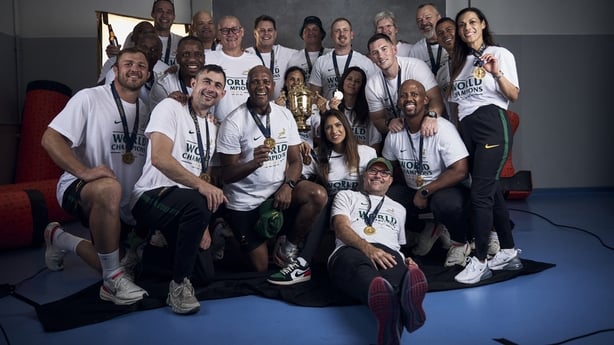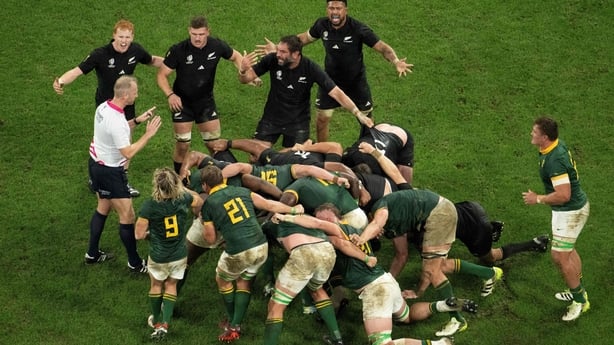The South African rugby team are currently touring their home country to visit the people that they represented during their deserved World Cup victory.
South Africa overcame New Zealand in a gripping final to beat their rivals to their fourth World Cup triumph. Both teams are tournament veterans and knockout rugby maestros. They both lost to higher ranked teams in the pool stages, Ireland and France, before crossing over and beating those teams in the quarter-finals.
South Africa have now gone back-to-back in the tournament. They've become experts at building their team to peak at the right time and in the right mindset for tournament rugby. Last time round in 2019, they lost to New Zealand in the pool stages before going on to lift the Webb Ellis trophy. This time, they lost to Ireland but beat three of the top five teams along the way to a historic win.
South Africa have been intriguing to follow since their last World Cup victory. Throughout the Lions tour and beyond, Rassie Erasmus has been the centre of attention, not always for the right reasons, but he’s been capturing the rugby media and public regularly.
Rassie and Jacques Nienaber do their own thing, they’re brave in their decision making and ideas around the game and ignore the status quo. The rugby community has shuddered at some of their ideas, most notably the 7:1 split of forwards and backs which they trialled when they hammered New Zealand at Twickenham in a warm up game.
They challenge teams psychologically, then they go out and challenge them both physically and emotionally during the 80 minutes of torture that they impose on the opposition during the match.

South Africa have brought ingenuity and abstract thoughts to the game, as well as their South African blunt force when it is needed. More importantly, Rassie and Jacques, once again, brought a greater reasoning and an empowered collective to their group.
They are typified by Pieter-Steph Du Toit’s 28 bone-shuddering tackles in the final, Eben Etzebeth’s demolition job, Cheslin Kolbe’s work rate and much more.
There’s a very personal approach to being a South African rugby player. I was lucky to encounter both Rassie and Jacques for a pre-season before I was forced to retire. Despite only knowing Rassie for a couple of weeks, he was very personable and inclusive when managing my retirement. It’s not a surprise to me when I see the buy-in that he gets from his countrymen.
Jacques has a very endearing way around his coaching too. He was our defence coach at Munster in 2016 and really energised the defensive side of the game. His visual approach to drawing a line in the dirt and making it a personal battle on the tackle line is a sure way to fire up any defensive player. Yet it’s a very tactical and methodical approach, grounded in work rate and collective understanding of the greater cause.
When you see Cheslin Kolbe sprinting across the pitch to help his opposite winger Arendse in stopping Mark Telea, or Eben Etzebeth fighting his way out of a maul to start the kick pressure, or bending at the hips to crunch Richie Mounga who is significantly shorter than him, you know the coaching is engrossing these players.
And while the players are enthralled in the overall plan, the coaches still had enough bravery in selection. They drew adversity on themselves with their hooker selections and revelled in it by replacing their world-class hooker with an out-half. An out-half that proved to be the difference in the end. When others would have gone with the obvious replacement, South Africa did their own thing.
A lot of credit has to go to Deon Fourie within this victory. When Malcom Marx was ruled out, Fourie stood up for his country. He battled away in the background to upskill and fill the potential gap that could be exploited by others. He plugged away in the less challenging matches and not everything went his way.
The unsung hero would have faced enough pressure returning to a specialised position, never mind the fact that he was already South Africa’s oldest debutant at 35 years of age in 2022.
He has spoken about keeping his throwing and front-row skills sharp, but having to go for 77 minutes against New Zealand in a World Cup final, just one season after making your international debut, is a testament to the attitude of Deon Fourie. His individual contribution to South Africa’s collective cannot go understated.
There’ll be talk about South Africa’s game plan lacking skill and entertainment but I’d have to disagree. There are many ways to play this game and South Africa do it their way, without an apology.
They played the most competitive games, coming through the harder side of the draw and therefore appear to have played the least expansive game because of the stakes at risk in most of their games.
When the pressure came on, France and New Zealand also relied heavily on a kicking game, a kicking game that South Africa have all but mastered.
The scrum is what makes this rugby union, and not another variation of the game. The lineout and maul are both standout features of rugby union too, and make the game what it is. There’s a lot of skill in the foundations of the game and South Africa have bought into those basics.

They didn’t have a clear advantage in the scrum during the final, if anything they were under more pressure during the final play than I’ve seen them in a long time at the scrum. Yet they probably had the most dominant scrum across the whole tournament, pretty fundamental really when you think of the laws of the game and the probability of knock-ons when administering a kicking game.
It was an area of the game that caught England in the end, despite driving the close nature of the aerial battle in the semi-final.
South Africa’s basics also came to the fore in the lineout. They caused Ireland huge amounts of problems in their pool game, despite their loss, and were able to simplify their attacking lineout when the pressure came on against New Zealand.
They did all of this with a playmaker that couldn’t polish his performances with a high goal-kicking percentage. Up stepped Handre Pollard to kick 13/13 despite a lack of game time due to injury. Coaches ruthlessness to replace their star man Libbok after 31 minutes in a semi-final and leave him out altogether in the final will be justified, as Pollard’s 100% success rate was the difference in the end.
Speak of growing the game, attacking superiority or refereeing decisions if you want, but don’t forget to credit South Africa for a fully deserved victory in this 2023 World Cup.
The long-term planning, abstract thinking and unorthodox methods are backed by a passionate nation and a tournament expertise that was unrivalled this time round. They are world champions once again.
Watch Leinster v Edinburgh (Saturday 3.05pm) and Munster v Dragons (Saturday 5.15pm) in the URC on RTÉ2 and RTÉ Player





